
Cover Story: Dr. Megan Littlefield Changes the Course of Community Health
A Passion to Give Back
Affixed to Dr. Megan Littlefield’s wall with multicolored thumbtacks and next to crayon colored drawings from her kids is a small black and white quote that you could miss if you didn’t look hard enough. Winston Churchill is said to have first spoken the words roughly 100 years ago. The small piece of paper reads, “We make a living by what we get. We make a life by what we give.” Today, these words live not only on Dr. Littlefield’s wall, but in her heart.
“Everyone has something to give,” Dr. Littlefield says with passion. “Everyone has something to give. That was something that influenced my life so much.”
At 43, Dr. Littlefield hasn’t let much grass, if any, grow under her feet. After hopscotching all over the East Coast for medical school, her residency and a journey working with other cities’ community health programs, she has served as the Medical Director for RiverStone Health for the past four years. She’s helping to change the lives of the vulnerable and underserved living in our community by trying to give them the gift of health. If you ask her why she feels a drive to do this work, she might tell you about her childhood and the debt she feels she needs to repay.
“I grew up in a single-parent family,” Megan shares. Even though her father lived just a few towns away, “For the most part, my mom raised me and my sister.” She adds, “Finances were very tough and I was on reduced lunches when I was little.” No matter how rough things got however, Megan says, “Even though we were on the receiving end of things, we were also very intent on giving back. As a family, we worked in homeless shelters and we were very involved in our church’s outreach mission.”
By the time she reached college, she volunteered for a Big Brother Big Sister program which targeted high risk youth. Megan ended up taking a nine-year-old Hispanic girl named Sonja under her wing and mentored her all through college. She never thought twice about heading to the girl’s home in the dilapidated high-rise housing project in the inner city area of New London, Connecticut. It probably wasn’t the safest area of town for a somewhat naive blond-haired, brown-eyed girl to be after dark. Megan admits, “My mom would freak out a bit about that!” But Megan didn’t think twice. “I would go with (Sonja) to the Centro de la Comunidad, the Latino Community Center. At this center, they had classes. They had a dentist that came and they had a little clinic there.” It was during those visits that a seed was planted. She says, “I realized what a huge impact health has on people in being able to change their lives. That was sort of the first time that I really thought, maybe I could impact people by being a physician and using my gifts in other ways.”
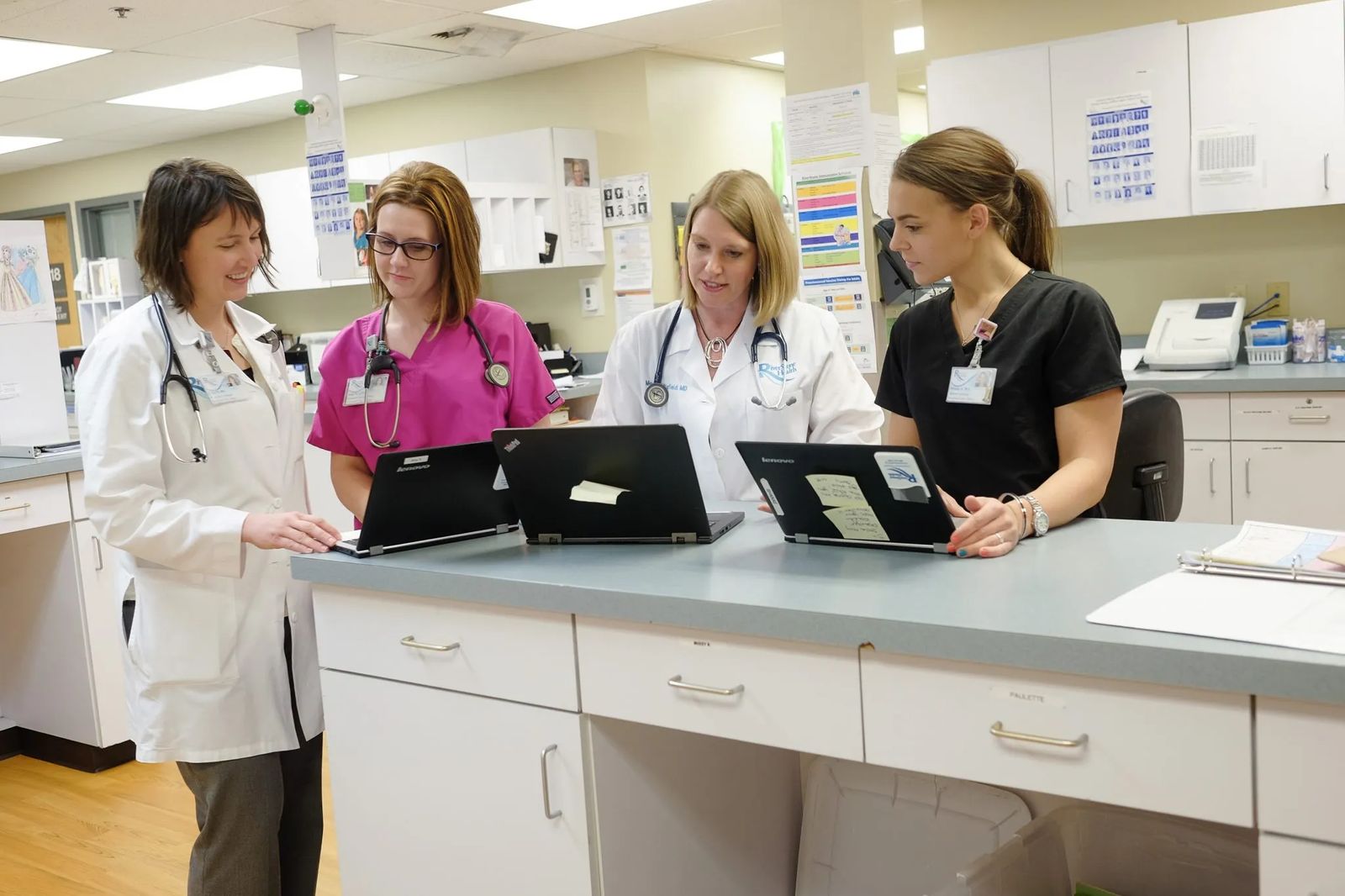
Reflecting on those days, Dr. Littlefield never takes for granted how different her own life could have ended up. “There were lots of opportunities for us to take a wrong path here and there. There were lots of people in our community from teachers to neighbors to youth group leaders, lots of people that kept my sister and me on the right track.” As she now works each day to better the lives of others, “I feel like my way of paying tribute to all of those people who influenced my life is to reach out to others and try to influence others in the same way.”
Today, Dr. Littlefield spends her time helping to build the doctors of tomorrow by teaching students in the Montana Family Medicine Residents program. She serves in a management role at RiverStone Health. She sees her own patients at the campus-based clinic and every other Wednesday, she heads down to Orchard School to serve at School District 2’s first school-based health clinic.
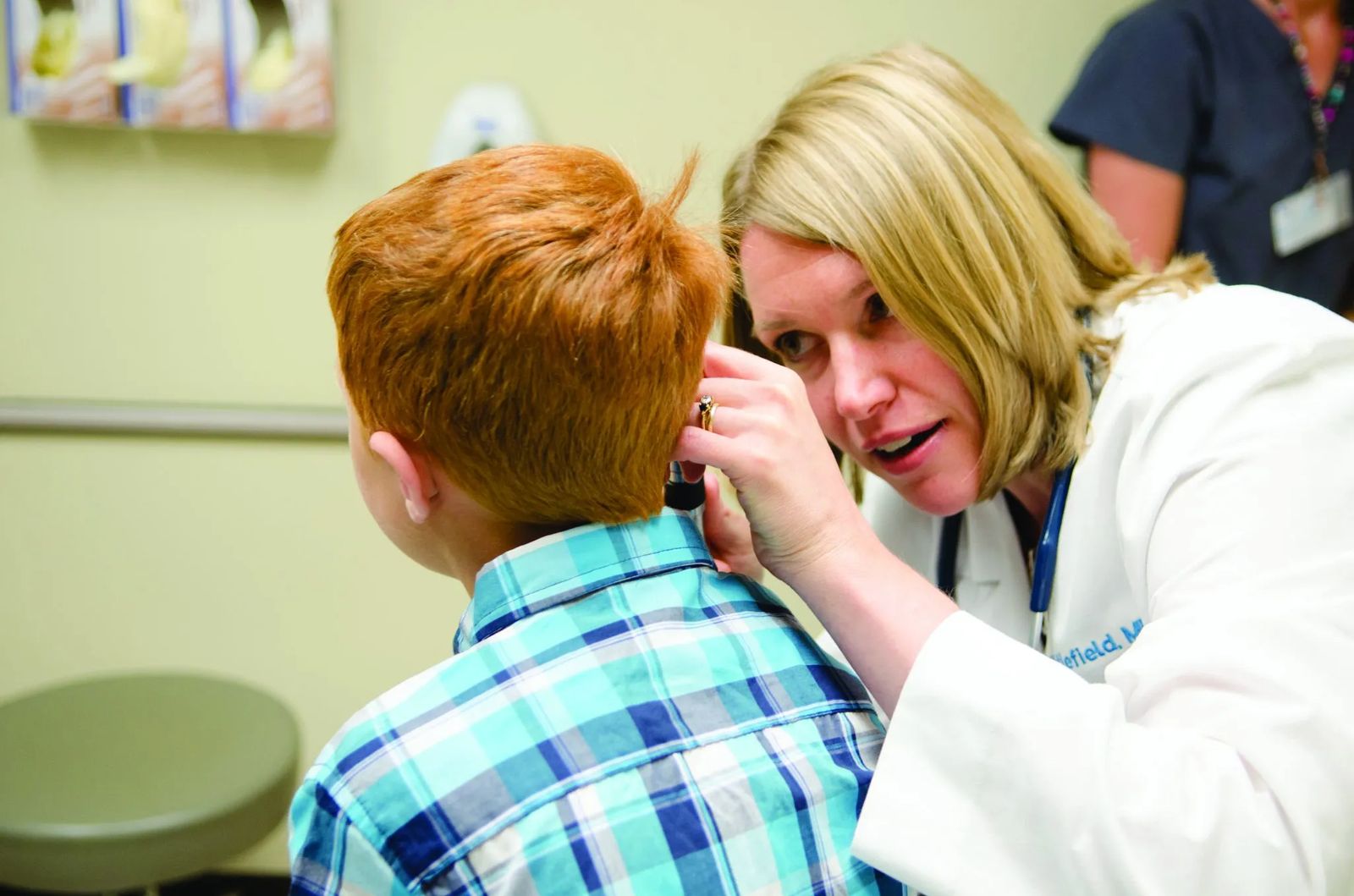
The Orchard School clinic might have been an idea that was sparked by Dr. Eric Arzubi, the chair of the Department of Psychiatry at the Billings Clinic. But Dr. Arzubi says it took no time at all to get Dr. Littlefield on board helping him to lead the charge. “What I love is the fact that she shared that passion and that vision,” Dr. Arzubi says. “She always has the best interest of the patient and the community in mind.” The result was an innovative partnership between School District 2, the Billings Clinic and RiverStone Health to provide a medical and behavioral health safety net for kids and their families.
“You have the power to hit them at a young age,” Dr. Littlefield says. When an illness strikes, all a child needs to do is walk down the hall to see the medical staff. “Not only are we a clinic, not only do patients come down or kids come down for routine care, but it also gives us the platform.” She explains why education is a pillar of the program. Dr. Littlefield says bad lifestyle habits and the obesity epidemic are taking a toll on health. She says, “This generation of kids is the first generation of kids that is not going to extend the life expectancy beyond where our life expectancy is now.”
Because RiverStone is a federally qualified health center, Dr. Littlefield says, “We are able to offer services to patients regardless of their ability to pay.” So, when a mother with medical issues walks into the school clinic with her son or daughter, she isn’t turned away. “We have this massive web and team of people who are able to offer all of these services.” Dr. Littlefield says, “It’s all that we really hoped that it would be.”
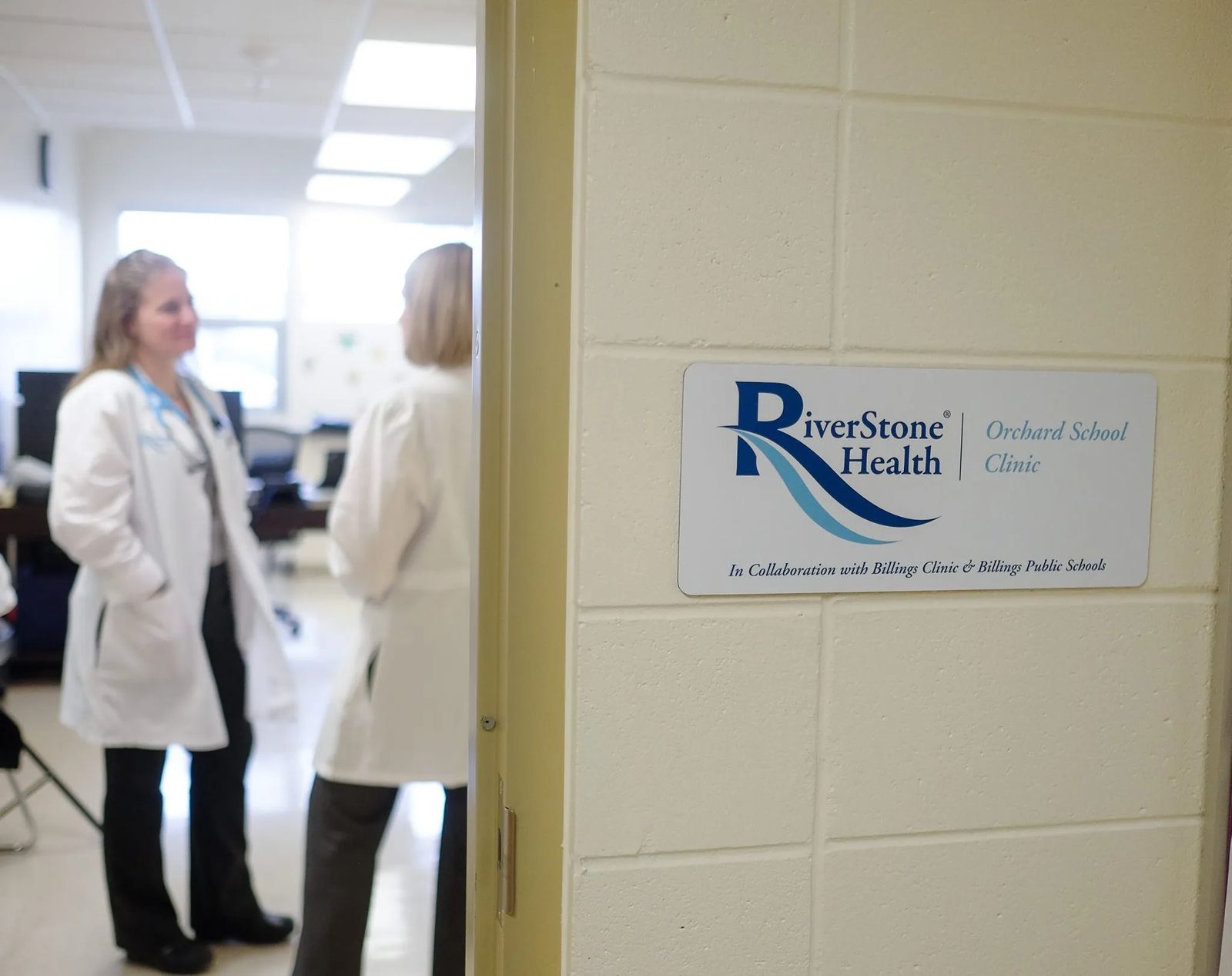
It’s important to note that any and all change initiatives started by Dr. Littlefield happened while she’s been busy overseeing a health system that annually serves more than 20,000 patients with roughly 90,000 patient visits a year between the medical, dental, behavioral health program, healthcare for the homeless and visits to one of four RiverStone satellite clinics. Despite keeping a watchful eye on the demanding care that’s delivered each day, Dr. Littlefield led the organization to develop a whole new philosophy of care known as Patient Centered Medical Home. RiverStone earned a level three designation, the highest level possible from the National Committee for Quality Assurance. It’s a model that believes good healthcare requires a team of care providers from physicians and physician assistants, to nurses, pharmacists, nutritionists, social workers, educators and care coordinators.
“Here they are all a part of a team and you can tag different people to come off the bench to help,” Dr. Littlefield says. By putting the patient at the center of this model, Littlefield says, “I realized what a huge impact health has on people being able to change their lives.” If she sees a patient is malnourished because of a lack of food, she can connect that family to a care coordinator for help. Through this model, she’s uncovered a whole host of issues from substance abuse to homelessness. She says, “We can really assess what that family needs and then figure out how to tap in to where those services are and connect people to them.” She knows, many times, these issues are far bigger than a simple trip to the doctor. “I can’t solve homelessness. I can’t solve poverty. I can’t solve substance abuse. But, I can nibble around the edges of all of those issues.” And she can teach others to do the same. “We are training our residents in that model. Talk about planting a seed. We are planting 8 seeds every year as we graduate these residents to be able to go out into different communities.”
John Felton, RiverStone Health’s Chief Executive Officer and President, has spent the last 12 years leading this community safety net. He couldn’t be more thankful for the passion and commitment Dr. Littlefield brings to the job each day. “If we could clone her, we would!” he says with a laugh. “It is one thing to theoretically understand a care delivery model, it is another to live it with every fiber of your being and that’s what Megan does.” He’s watched her travel to Helena to testify for Medicaid expansion in Montana to improve access to health care for all Montanans. He’s stood behind her when she furthered RiverStone’s mission to tackle the prescription drug abuse crisis. Not only did she work with the Montana Medical Association to help establish the knowyourdosemt.org website, which spells out the mounting problem and targets prevention, she’s spoken out to providers on how to manage and prescribe chronic pain medications in a safe way. She lobbied the Montana Medical Association to improve its pain medication registry. She knew there had to be a better way for doctors to keep tabs on a person’s prescription drug history to prevent abuse.
“It’s a big problem,” Dr. Littlefield stresses, “and a growing one.” She is quick to point out that between 2011 and 2013, more than 300 Montanans died because of prescription drug abuse. She says, “This makes prescription drug abuse fifteen times more deadly than heroin, meth and cocaine combined.” She adds that its victims are often younger than we would care to admit. “According to the 2011 Montana Youth Risk Behavior survey, 18% of middle schoolers and high schoolers have reported abusing drugs like Vicodin and OxyContin. By 12th grade 23% have abused one of these drugs. That is almost 1 in 4!” In reaction to these stats, Dr. Littlefield simply says, “This is striking and dangerous.” She’s seen firsthand how this addiction is growing in veracity. “It is destroying lives and destroying families.”
Looking at what Dr. Littlefield has been able to accomplish in less than five years, John Felton says, “She has really moved the needle on community health because of her approach to care.” He’s watched her leadership style impact virtually every corner of RiverStone from the top down. “She’s very compassionate, but she is also driven. She’s not driven for the glorification of Megan. She genuinely cares about people. That comes through in everything she does. You can see Megan’s fingerprints on everything that we do clinically.”
The next big initiative that Dr. Littlefield has a hand in is one that will not only change the face of care but will change the actual care facility. RiverStone is in the design phase for a brand new $11 million health center. They’ve raised $7.5 million, enough to break ground this summer. RiverStone is applying for grants and seeking the community’s help to raise the difference. Dr. Littlefield couldn’t be more excited to watch this new complex south of the current facility take shape.
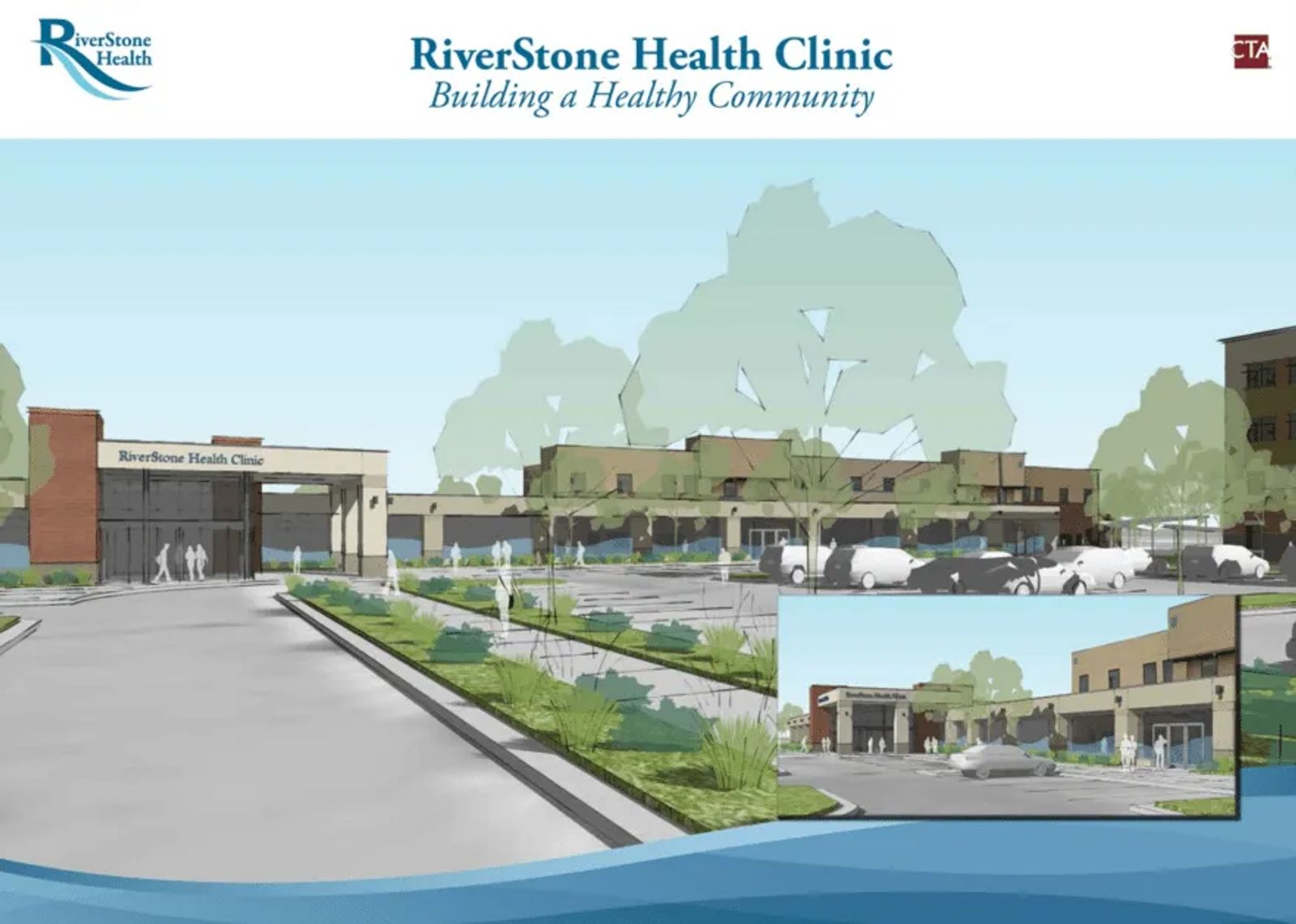
“That will be one of the most exciting projects. Seeing that project come to fruition will be, I think, one of the highlights of my career,” Dr. Littlefield says. “The plans are looking amazing and I can’t wait to see this project come together. It will be such a powerful impact on the community.”
The new building, named the Ballard Center to honor the Ballard family’s $1 million contribution to the project will be one aimed at bringing together all the players in the Patient Centered Medical Home model. Dr. Littlefield explains by saying, “It is really exciting to build the space that is going to allow us to teach better, have all of our team members right together in the same space with consult rooms, medical rooms and behavioral health rooms.” When it is all said and done, the facility will have 48 exam rooms linked to all critical areas of care. Right now, RiverStone has 31 rooms with team members spread out all over the campus.
You might wonder how a woman can lead medical services at the largest community health care facility, establish new programs, keep her finger on the pulse of legislative change and champion the center’s largest capital campaign to date. You’d venture a guess that her work-life balance has to be out of sync. John Felton says it’s a wonder to witness how she gets it all done. “If there were 30 hours in a day, she would find a way to fill them but she never forgets about her family.” He says she never misses a chance to be on the sidelines of her kids’ soccer games. She coaches her daughter’s robotics team, which qualified for national competition. Most weekends, even she admits that she, her husband Ben and two kids head for the hills to hike, camp and enjoy the outdoors, one of the main reasons her family landed in Montana. Felton says, “I think she understands the care of families because she is such a strong family person.”
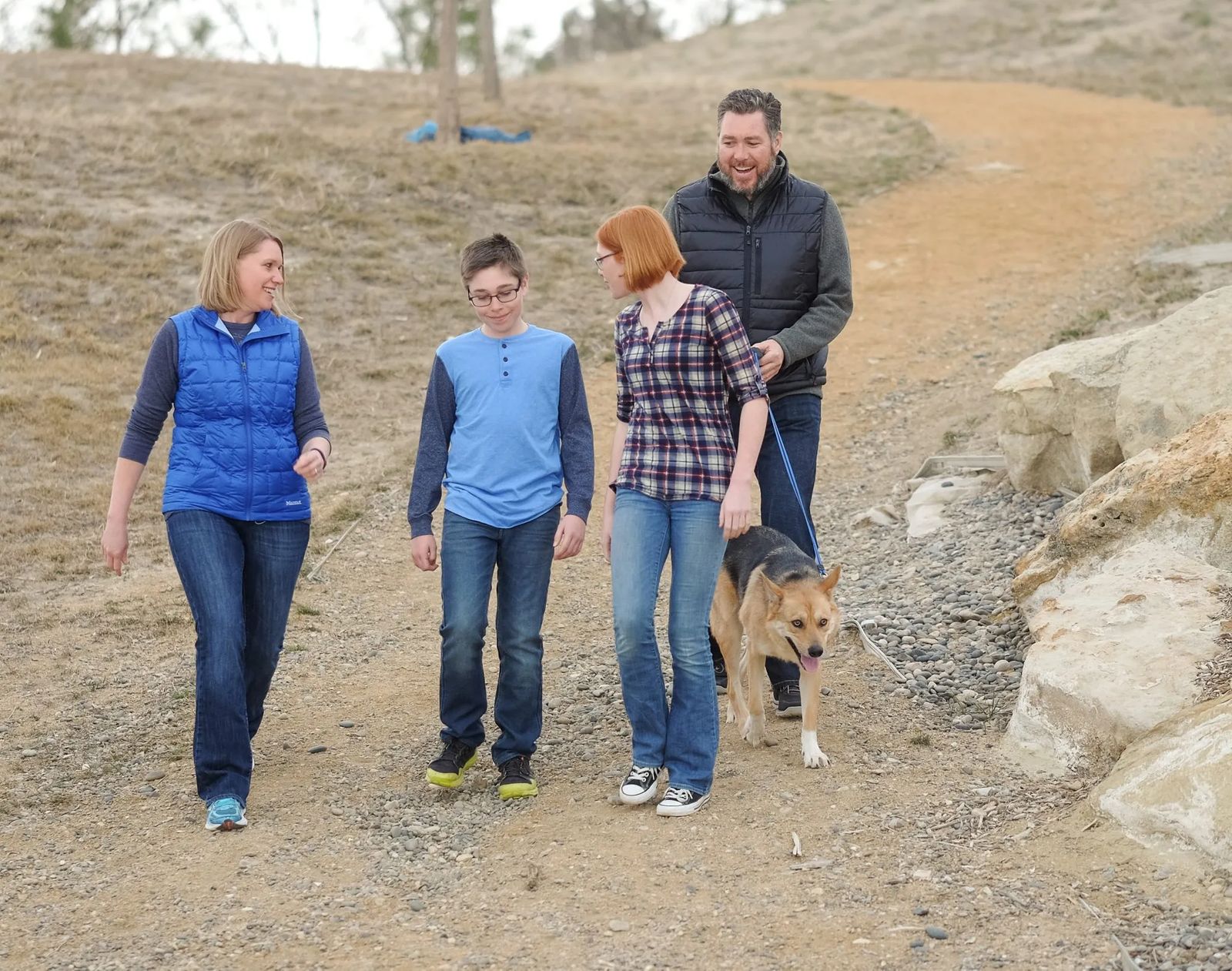
When it comes to Megan’s children, you could say the apple didn’t fall far from the tree. Thirteen-year-old Olivia and 11-year-old Conor have already helped lead philanthropic projects of their own. Conor loves putting together hygiene kits and making sandwiches for the homeless through the family’s church. Olivia not only led a book drive at her school for the kids served by RiverStone, she led a drive to deck out the ‘Tree of Warmth.’ It’s a tree in RiverStone’s lobby that is adorned with hats, gloves and scarves for RiverStone’s patients to take if needed, no questions asked.
“The whole student council at Rose Park brought over a huge delivery for the Tree of Warmth. Olivia went on to middle school, but the student council decided to do this project again this year. She helped start a tradition,” Dr. Littlefield says with pride. “I think when children at a young age recognize that they have that ability to make an impact on others in the community or in the world, it is a really empowering feeling.”
For Megan, it’s more than a project here or there. It’s about helping her kids understand the human condition. “I try to teach my kids, when they are afraid, when they are in a situation, or when they meet someone that looks funny or is different from them, you need to hear their story. You need to seek understanding first before you make judgements about them.”
Over the years, Megan has looked at her past and wondered what ever happened to her one-time little sister Sonja. “I followed up with her once after I graduated. She had started to date an older gentleman who was one of the drug dealers in the area. I don’t know what ever came of her.”
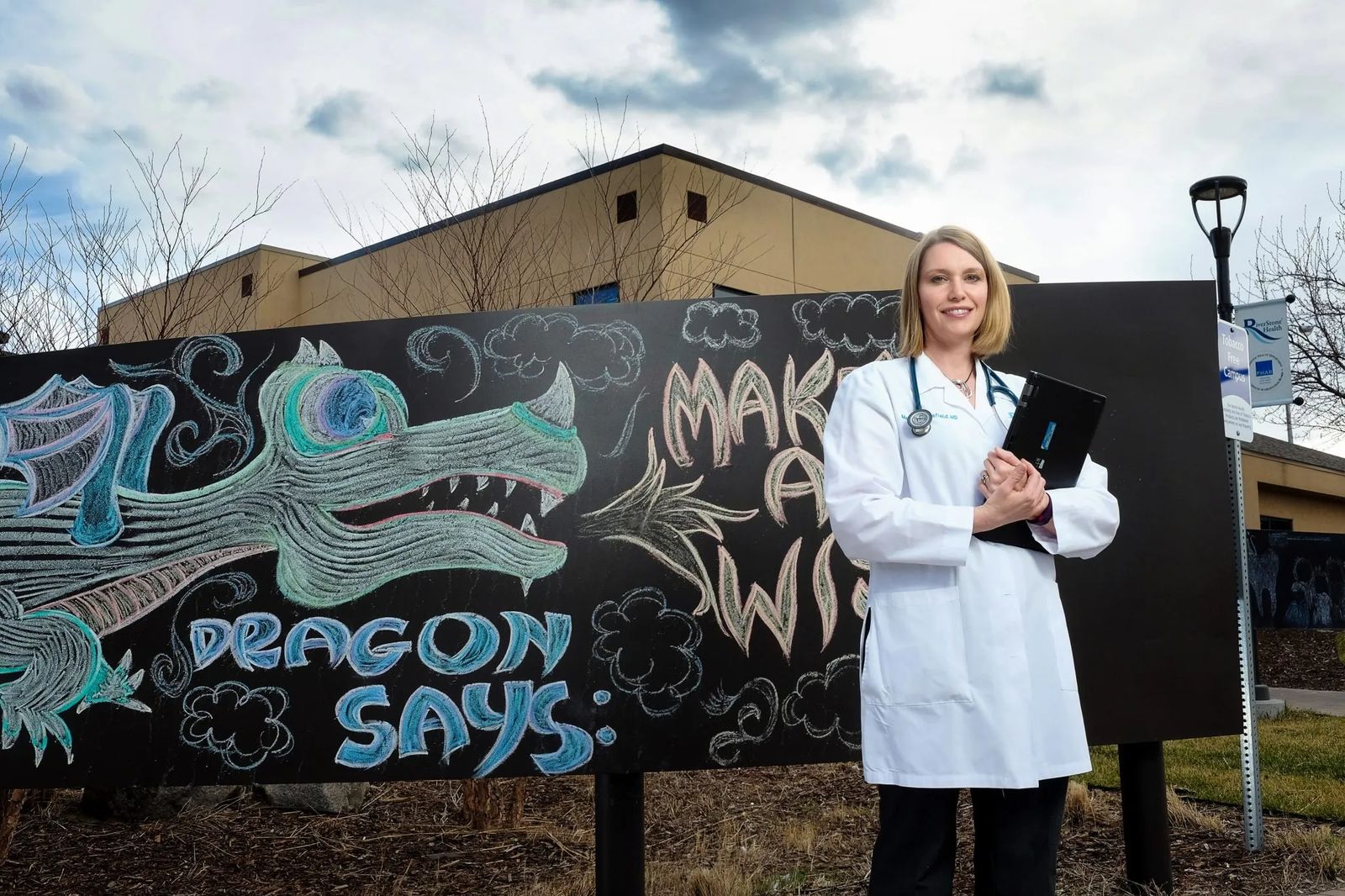
While the news was disheartening, Megan Littlefield knows when you care for those in high risk situations, the outcome isn’t always what you hoped it would be.
“You have to have that belief that even if you throw that lifeline and people don’t’ take it or they take it and they fall off again, the answer is not to say, ‘Well, I tried it, I am not going to throw that lifeline again,’” she says. “I think it is one of the reasons why I have felt this calling.”
And, just as she shares with her children, she prides herself on listening. “Everyone has their story, you need to listen to peoples’ stories. People are writing their stories. I love being able to tell people, ‘You can change the way your story is being written.’” With passion in her voice she says she’s living proof of the power to change. “I was able to do that. I was able to change my story.”
Editor’s Note: To learn more about the services at RiverStone Health or find out how you can help with its current capital campaign, visit riverstonehealth.org















